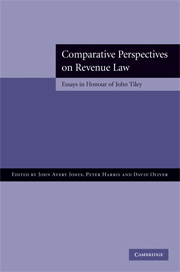Book contents
- Frontmatter
- Contents
- Contributors and affiliations
- Foreword by Dave Hartnett
- Foreword by Hugh Ault
- 1 A comparison of statutory general anti-avoidance rules and judicial general anti-avoidance doctrines as a means of controlling tax avoidance: Which is better? (What would John Tiley think?)
- 2 The judicial approach to avoidance: some reflections on BMBF and SPI
- 3 Comparing the application of judicial interpretative doctrines to revenue statutes on opposite sides of the pond
- 4 Abuse of rights and European tax law
- 5 The US legislative and regulatory approach to tax avoidance
- 6 The law of taxation and unjust enrichment
- 7 The history of royalties in tax treaties 1921–61: Why?
- 8 Land taxation, economy and society in Britain and its colonies
- 9 Meade and inheritance tax
- 10 Taxation, human rights and the family
- 11 Family connections and the corporate entity: income splitting through the family company
- Epilogue: Establishing the foundations of tax law in UK universities
- References
- Table of cases
- Table of abbreviations
- Index
11 - Family connections and the corporate entity: income splitting through the family company
Published online by Cambridge University Press: 07 December 2009
- Frontmatter
- Contents
- Contributors and affiliations
- Foreword by Dave Hartnett
- Foreword by Hugh Ault
- 1 A comparison of statutory general anti-avoidance rules and judicial general anti-avoidance doctrines as a means of controlling tax avoidance: Which is better? (What would John Tiley think?)
- 2 The judicial approach to avoidance: some reflections on BMBF and SPI
- 3 Comparing the application of judicial interpretative doctrines to revenue statutes on opposite sides of the pond
- 4 Abuse of rights and European tax law
- 5 The US legislative and regulatory approach to tax avoidance
- 6 The law of taxation and unjust enrichment
- 7 The history of royalties in tax treaties 1921–61: Why?
- 8 Land taxation, economy and society in Britain and its colonies
- 9 Meade and inheritance tax
- 10 Taxation, human rights and the family
- 11 Family connections and the corporate entity: income splitting through the family company
- Epilogue: Establishing the foundations of tax law in UK universities
- References
- Table of cases
- Table of abbreviations
- Index
Summary
Introduction
This book has been structured along the lines of two themes that (amongst others) inspire the writings of John Tiley. The first of these themes, avoidance, essentially involves using tax law in a manner that is contrary to legislative intent. The second of these themes, taxation of the family, involves proper identification of the tax subject and so is one of the fundamental structural features of the income tax. It is, therefore, not surprising that John is interested in a case such as Jones v Garnett, which involves something of an intersection between these two themes. Jones v Garnett involves the family business with, like so many avoidance cases, an artificial entity (a company) inserted between the business and the family members. This paper takes a conceptual and retrospective look at the taxation of the family company and how it may be and has been used to determine the allocation of income to the tax subject identified by the legislature.
Jones v Garnett is in many ways a classic fact pattern for a family company. Two family members (Mr and Mrs Jones) owned equally the shares in a private company, Artic Systems Ltd. They both worked for the company but unequally, Mrs Jones working as an administrator for around five hours per week. Both drew small wages, particularly Mr Jones. In accordance with tax advice, they relied for their family income on the distribution of dividends not wages.
- Type
- Chapter
- Information
- Comparative Perspectives on Revenue LawEssays in Honour of John Tiley, pp. 244 - 287Publisher: Cambridge University PressPrint publication year: 2008



